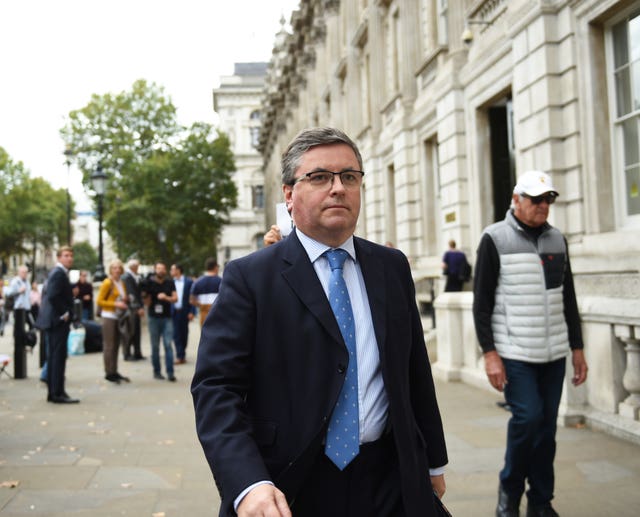
Theresa May has urged MPs to seize a “once-in-a-generation opportunity” to help domestic abuse survivors by passing “landmark” new laws.
The former prime minister used her Commons first speech since returning to the Tory backbenches to champion the Domestic Abuse Bill, seen as a key part of her legacy from her time in Number 10.
Mrs May insisted the legislation is about “changing the attitude” people take to domestic abuse and also “challenge” MPs, the Government and society to take the issue “as seriously” as those contributing in the chamber.
She also recalled stories of people, particularly women, who have been hit by their partners, adding it is “the sadness in our society” that so many people “don’t know what a good relationship is” and who “suffer in silence”.
Mrs May’s contribution came before Labour’s Rosie Duffield (Canterbury) received a standing ovation after she spoke of her own experience of coercive control.
Justice Secretary Robert Buckland also acknowledged there is a “heck of a way to go” to help domestic abuse survivors and committed to abide by changes approved by MPs.

Several MPs urged the Government to address the issue of stalking in the Bill, with support for migrant women and giving domestic abuse survivors priority need status for housing among the other proposals.
The Bill seeks to give better protection to those fleeing violence by placing a new legal duty on councils to provide secure homes for them and their children.
It would also introduce the first legal Government definition of domestic abuse, which would include economic abuse and controlling and manipulative non-physical behaviour.
A domestic abuse commissioner to champion survivors is also proposed.
The Bill received an unopposed second reading and a carry-over motion was also passed, meaning it will not fall if Parliament is prorogued next week.
Speaking at second reading, Conservative MP Mrs May said: “Domestic abuse blights lives, it can destroy lives, and not just the life of the immediate victim, but of those children and other family members as well.”
She added: “I believe this is a landmark piece of legislation.”
Mrs May went on: “It’s been described by Government and indeed by charities and others involved with working with the victims of domestic abuse as a once-in-a-generation opportunity to make sure we take a step change in the approach we take to supporting victims and to dealing with domestic abuse.”
Mrs May recalled launching a campaign of advertisements about “what a good relationship was” during her time as home secretary, noting: “The saddest thing was reading some of the comments that the young people, particularly young women, made when they had seen those adverts in cinemas and elsewhere.
“Comments like ‘I didn’t know it was wrong for him to hit me’.
“This is the sadness in our society, of so many people who don’t know what a good relationship is and who suffer from their bad relationship, and who suffer in silence for too many – as we’ve heard – for many years before any action is taken.”
She also recalled being told how one woman had been locked in a cupboard by a perpetrator so she could not physically get to court to give evidence.
Turning to the police, Mrs May spoke about helpful developments such as body-worn video cameras to ensure footage was taken on arrival at a reported incident.
She said: “Police forces need to look at how they deal with domestic violence and domestic abuse within the force where police officers themselves are subject to such domestic abuse and if they turn a blind eye, then that gives a message to their officers as how they should treat people outside the force who are reporting abuse.”

Opening the debate, Mr Buckland said: “I do believe the days of the courts approaching abuses as ‘just a domestic’ have happily gone, but my goodness me we still have a heck of a way to go.”
He added: “In the year ending March 2018, some two million adults between 16 and 59 years of age experienced domestic abuse – two million people whose everyday lives are blighted by abuse and who live with those effects, be they physical or be they emotional.
“So you can see the high degree of duty we have to them by passing this legislation.”
For Labour, shadow women and equalities minister Carolyn Harris welcomed the “long-awaited” Bill and called for it to have “greater scope”, including the role of domestic abuse commissioner to be a full-time position.
She said: “If the commissioner is going to successfully deliver a whole-society response and radically improve the UK’s approach to domestic violence then a part-time position is just not viable.”
Ms Harris also said: “I have very real concerns about migrant victims when we eventually leave the EU. Under the EU settlement scheme, European citizens and their families will need to apply to secure their status in the UK.
“Survivors of domestic abuse are at a particular risk of being left out of this by abusive partners in a bid to control and isolate them.
“The Government must ensure that legislation is in place to support these victims, allowing them to apply even after the deadline has passed in order to prevent a situation where survivors are forced to choose between staying with their abuser or being illegally resident in the UK.”


Comments: Our rules
We want our comments to be a lively and valuable part of our community - a place where readers can debate and engage with the most important local issues. The ability to comment on our stories is a privilege, not a right, however, and that privilege may be withdrawn if it is abused or misused.
Please report any comments that break our rules.
Read the rules here